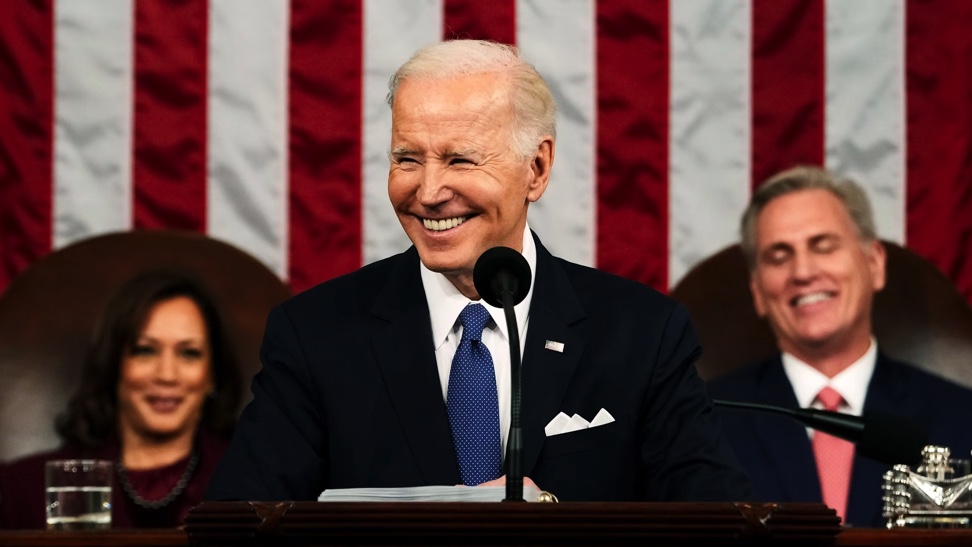
David Frum: Voting Against Trump
Notorious RINO and Atlantic writer David Frum joins Jamie Weinstein to explain why he’s voting for Kamala Harris this election. Frum, a former speechwriter for President…
Thought Leader: David Frum

In September 2009, a Republican representative from South Carolina named Joe Wilson inserted himself into history. He interrupted President Barack Obama’s speech to a joint session of Congress by shouting, “You lie.”
The outburst shocked viewers. Wilson, not Obama, was the top trending item on Twitter in the aftermath of the speech. Wilson apologized, “I let my emotions get the best of me.” Then–Republican Conference Chair Mike Pence expressed regret: “Joe made a mistake.” Wilson was formally reprimanded by a vote of the House.
More than a decade later, that all seems quaint. Not only did Republicans repeatedly heckle, jeer, and shout during President Joe Biden’s State of the Union address Tuesday night, but Biden was ready for them. In impromptu remarks not included in the prepared text of the speech, Biden rolled with the interruptions, using them to reinforce his message. Biden accused “some” Republicans of plotting to sunset Social Security and Medicare. When he got protests, he grinned and accepted them as a “unanimous” endorsement. “I welcome all converts,” he told them, recasting for the television audience the Republican hubbub as a sign of submission.
Partisanship, populism, and patriotism were his themes. The speech was strewn with traps carefully constructed to ensnare opponents. He opened with a tribute to bipartisanship, but the mechanics of his address were based on shrewd and unapologetic hyper-partisanship. He anticipated negative reactions in the chamber—and used them to reinforce his message.
Obama came to national attention in 2004 with a speech about the essential political and cultural unity of the American people. Biden made a few nods to that notion, but he’s plainly not betting on it. Instead, he pushed Republicans on pain point after pain point. He mocked Republicans who voted against his infrastructure but still show up at the groundbreakings. He tied a stout defense of Medicare to advocating higher taxes on people who earn more than $400,000.
He also bid against Republicans on economic nationalism, equating imports with job losses, exports with job gains. Farewell to Clinton- and Bush-era celebrations of free trade. Hello to “Buy American.” If Trumpism had any kind of economic basis (a big if), Biden issued commitment after commitment to outdo his predecessor as the champion of American industry against international competitors.
This time, though, the trade agenda was linked to a bigger promise to defend middle-class incomes against airline fees, credit-card charges, and expensive insulin. This was populism with teeth sharpened against domestic targets as well as foreign ones.
All of this was wrapped in red, white, and blue invocations of American jobs, American democracy, American pride, American purpose—and garlanded with an impromptu taunt aimed at China’s leader. “Name me a world leader who’d change places with Xi Jinping—name me one, name me one!” That’s the kind of chest-thumping that gets struck from presidential addresses as the drafts get passed from one inbox to another in the executive branch. Biden bypassed those cautious editors by adding the rhetoric himself—when it was too late for them to object.
This State of the Union address was less a plan of action and more a plan of attack for the next election, as he hopes to contest it. Old as he is, Biden has learned some new tricks. “I’m Not Here to Make Friends” is the title of a hit song released two weeks before the speech. Beijing got the same message from Biden.
In this hyper-polarized era, the goal of the survival-minded politician is not so much to offer grand visions as to expand his own coalition, even if only a little, while squeezing his opponents where it hurts most. Like a boxer trying to goad his antagonist into leaving open a vulnerable spot for a counterpunch, Biden’s plan was to invite Republicans to make dangerous mistakes. This was a speech not of lofty phrases but of cunning ploys; not one for the ages, but one that will reverberate long enough to make a difference in November 2024.
David Frum: Voting Against Trump
Notorious RINO and Atlantic writer David Frum joins Jamie Weinstein to explain why he’s voting for Kamala Harris this election. Frum, a former speechwriter for President…
Thought Leader: David Frum
This is the latest episode of Climbing Gold with Alex Honnold. Tucked away in a corner of Chilean Patagonia, Valle Cochamó wasn’t going to stay hidden…
Thought Leader: Alex Honnold
Sanjay Gupta: Self-Exams Matter
This is the latest episode of Chasing Life with Dr. Sanjay Gupta. Sara Sidner is a hard-hitting CNN journalist. Ananda Lewis is a content creator and former…
Thought Leader: Sanjay Gupta

